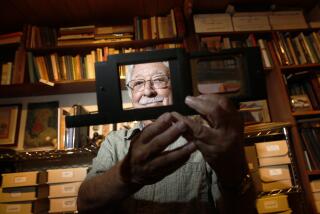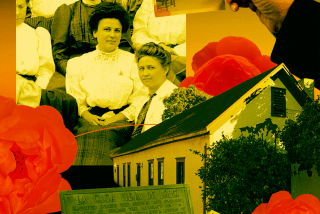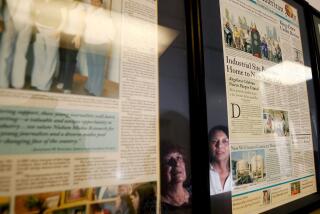Show Plows : Farming: Antique tractors, graders and the like make up Pepe Sanchez’s shrine, admired by equipment aficionados.
Pepe Sanchez’s ranch in the northernmost part of the Santa Monica Mountains is an unofficial landmark of Yerba Buena Road.
Motorists, bicyclists and bikers who climb the steep and winding eight-mile road from the Pacific Coast Highway find Sanchez and his display of antique farm equipment near the summit of Boney Mountain.
Sanchez, a leathery-faced former ranch hand who still looks like a cowboy, exhibits his plows, tractors and graders as a shrine to farming.
About 30 pieces of farm equipment are scattered across his 35-acre ranch, a collection of rusting relics that has grown each year since Sanchez bought the property in 1951. Some of the equipment dates back a half century or more.
Tourists often stop to take pictures.
Colleen Wilhelm, 35, said she stumbled onto the display while on a drive from her home in Hermosa Beach to the National Park Service’s Circle X Ranch near Sanchez’s ranch.
“It looks like it should be named Tractorville,” she said.
The tractor collection includes a boxy Caterpillar, a sleek Farmall Cub and a graceful Minneapolis Moline.
“This is my own museum,” Sanchez said recently, as a sunset cast long shadows across his rolling hillside ranch. “I’ve got graders and plows and disks and planters and mowing machines.”
Sanchez, 66, fell in love with farm equipment when he was just 6, when his Mexican immigrant father taught him how to drive a tractor.
“They’re all my favorites,” he said. “I love them all.”
Leticia Morgan, 26, the youngest of Sanchez’s five children, said she has grown used to the farm equipment. By the time she was 8, she had learned to drive one of the smaller tractors.
“He had me oiling screws when I was little,” she said. “I knew more about tractors than my husband did when I got married.”
Born in a tiny Mexican village, Sanchez arrived at Ventura County’s southern coast in 1925, when his father came to work on a ranch owned by wealthy Los Angeles industrialist Henry Chamberlain.
Sanchez said his father taught him how to drive his first tractor, a model called a Cletrac, about the time that he first started school. He has never been away from machinery since. He still runs a grading business out of his small ranch house.
Unlike the cushioned, air-conditioned equipment of today, his Depression-era tractors were difficult to operate and quick to turn over, Sanchez said.
Every piece of equipment in his collection has a story. One of his favorite tractors is a 1929 Fordson made by the Ford Motor Co. and given to him by a friend. It is the centerpoint of a row of tractors displayed amid weeds in his front yard.
“I seen it as a child working. One day I said, ‘Pete, are you going to do anything with that old Fordson?’ He said, ‘Take it,’ ” Sanchez said. “Most ranchers give them to junkers to use as scrap iron. They’re tired of seeing them.”
In 1965, Sanchez paid $500 to tow another free acquisition, a diesel-powered tractor, from Porterville.
Two tractors have been restored to their original red and yellow, but the rest have rusted after years of exposure. Despite their condition, Sanchez refers to the relics as his jewels.
“A lot of people ask me, ‘Why don’t you paint them?’ “he said. “But I like them that way.”
Fellow tractor enthusiasts have admired the collection from afar.
Jane Wischstadt, a manager at the Antique Gas and Steam Engine Museum in San Diego County, said she has seen Sanchez’s tractors in photographs passed along by a San Fernando collector.
As with Sanchez, many farmers are too attached to their equipment to give it away, even when it no longer runs, Wischstadt said.
Bob Pfeiler, chairman of the Ventura County Farm Implement Museum, said he is pleased to see that some of the tools of the county’s farming history have survived. Many of the earliest tractors were dismantled or melted down after ranchers donated them to the war effort during the early 1940s.
“We didn’t realize at the time these tractors were antiques,” Pfeiler said.
Sanchez said he wants to set aside his tractors for his children under a provision that they never be sold.
He never wonders how much his collection is worth, he said. And he has never had the tractors appraised.
“To me they’re irreplaceable,” he said.
More to Read
Sign up for Essential California
The most important California stories and recommendations in your inbox every morning.
You may occasionally receive promotional content from the Los Angeles Times.









